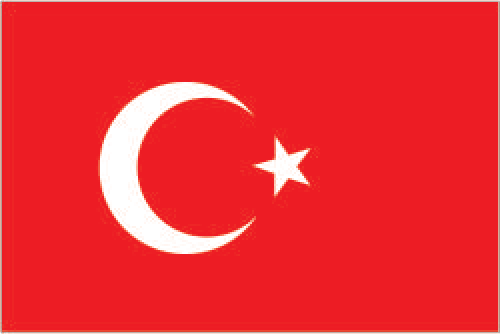Capital City: Ankara
Population: 81,619,392 (July 2014 est)
Currency: Turkish Liras (TRY)
Land Area: 783,562 sq km. Strategic location controlling the Turkish Straits (Bosporus, Sea of Marmara, Dardanelles) that link Black and Aegean Seas; Mount Ararat, the legendary landing place of Noah’s ark, is in the far eastern portion of the country.
Dominant Religions: Muslim 99.8% (mostly Sunni), other 0.2% (mostly Christians and Jews)
Land Boundaries: Armenia 268 km, Azerbaijan 17 km, Bulgaria 240 km, Georgia 252 km, Greece 206 km, Iran 499 km, Iraq 352 km, Syria 822 km
Location: Southeastern Europe and Southwestern Asia (that portion of Turkey west of the Bosporus is geographically part of Europe), bordering the Black Sea, between Bulgaria and Georgia, and bordering the Aegean Sea and the Mediterranean Sea, between Greece and Syria
Climate: Temperate; hot, dry summers with mild, wet winters; harsher in interior. The climate in Turkey has a vast diversity depending on the diverse topography and latitude. Aegean and Mediterranean coastal areas enjoy the typical Mediterranean climate. There is hardly a drop of rain during the sunny and hot summer (May to October). Winters are mild and rainy in these regions, and it very rarely snows at coastal areas, with the exception of mountainous areas higher than 2000 metres of these regions, which are very snowy and are frequently not passable. The water temperature in the Aegean and Mediterranean Seas is warm during the long summer season (May to October) which constitutes the swimming season and fluctuates between 23° and 28°C from north to south.
Terrain: High central plateau (Anatolia); narrow coastal plain; several mountain ranges
Visa: As of 10 April 2014, nationals of Australia will not be able to obtain sticker-type visas at the port of entry any more and should apply online for the Turkish e-Visa. The cost for an Australian passport is US$60. Visa and Mastercard credit/debit cards are accepted as payment methods
Entry Point: Gurbulak (from Bazargan, Iran)
Exit Point: Ipsala (to Kipoi, Greece)
Cuisine: Turkish cuisine combines Mediterranean, Central Asian, Caucasian, and Arabic influences, and is extremely rich. Beef is the most important meat (lamb is also common but pork is very hard to find although not illegal), and eggplant (aubergine), onion, lentil, bean, tomato, garlic, and cucumber are the primary vegetables. An abundance of spices is also used. The main staples are rice (pilav), bulgur wheat and bread, and dishes are typically cooked in vegetable oil or sometimes butter.

